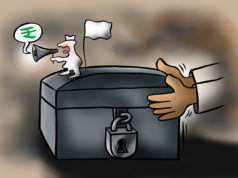Bharat Sanchar Nigam Limited (BSNL), the Indian public sector undertaking in the field of telecommunication, has been unable to pay the Rs 850 crores in salaries to its 1.74 lakh employees for the month of June 2019 and has approached the government seeking immediate assistance. Under massive debt for many years, BSNL is not a stranger to such situations. Here are four things you should know about BSNL (for you have been paying for it all along):
- Mounting debts and losses: Established in the year 2000, BSNL – once a Navratna PSU – has been in debt since 2010-11. Last time it made profits was in the year 2008-09, after which it has been consistently reporting losses, so much so that its total debt at the end of 2018-19 stands at Rs 14,000 crores. The telco is said to have accumulated operating losses to the tune of Rs 82,000 crores over the years.
- High employee costs: Employee costs made up about 66 per cent of BSNL’s operating revenues in the financial year 2018-19 as against 21 per cent in the financial year 2006-07.
- Sitting on a mountain of cash, yet borrowing: While BSNL has pegged its fixed assets at Rs 42,507 crores as of 2016, its own balance sheet from 2017-18 estimates its assets at Rs 1.32 lakh crores. Instead of liquidating a few assets pay off the debts, BSNL is seeking more money from the government to stay operational.
- Deserting customers: As per data from the Telecom Regulatory Authority of India (TRAI), BSNL’s market share has come down to 9.7 per cent in January 2019 from 19 per cent in March 2009. Yet again the government is contemplating using taxpayers’ money to bailout BSNL, which has a customer base of 11.62 crores out of the telecom subscriber base of over 120 crores.
The government is seeking immediate loans of Rs 2,500 crores to keep the Public Sector Undertaking afloat. This amount will sustain operations only for about 6 months and this is a big deterrent for the lenders. This is an unsustainable model and the fate of BSNL needs to be reconsidered. Telecom is not a public good and it does not make sense for the government to hold onto a failing Public Sector Undertaking.
The high employee costs of BSNL are unfit for today’s competitive markets when enterprises across the spectrum are economising and cutting down costs to survive and remain competitive. The government cannot continue the practice of bailing out perpetually sick Public Sector Undertakings using taxpayers’ money, over 90% of whom aren’t even choosing to opt for that service yet end up subsidising high bonuses of government employees.
Read more: https://spontaneousorder.in/why-bsnl-needs-to-hang-up/
Post Disclaimer
The opinions expressed in this essay are those of the authors. They do not purport to reflect the opinions or views of CCS.






